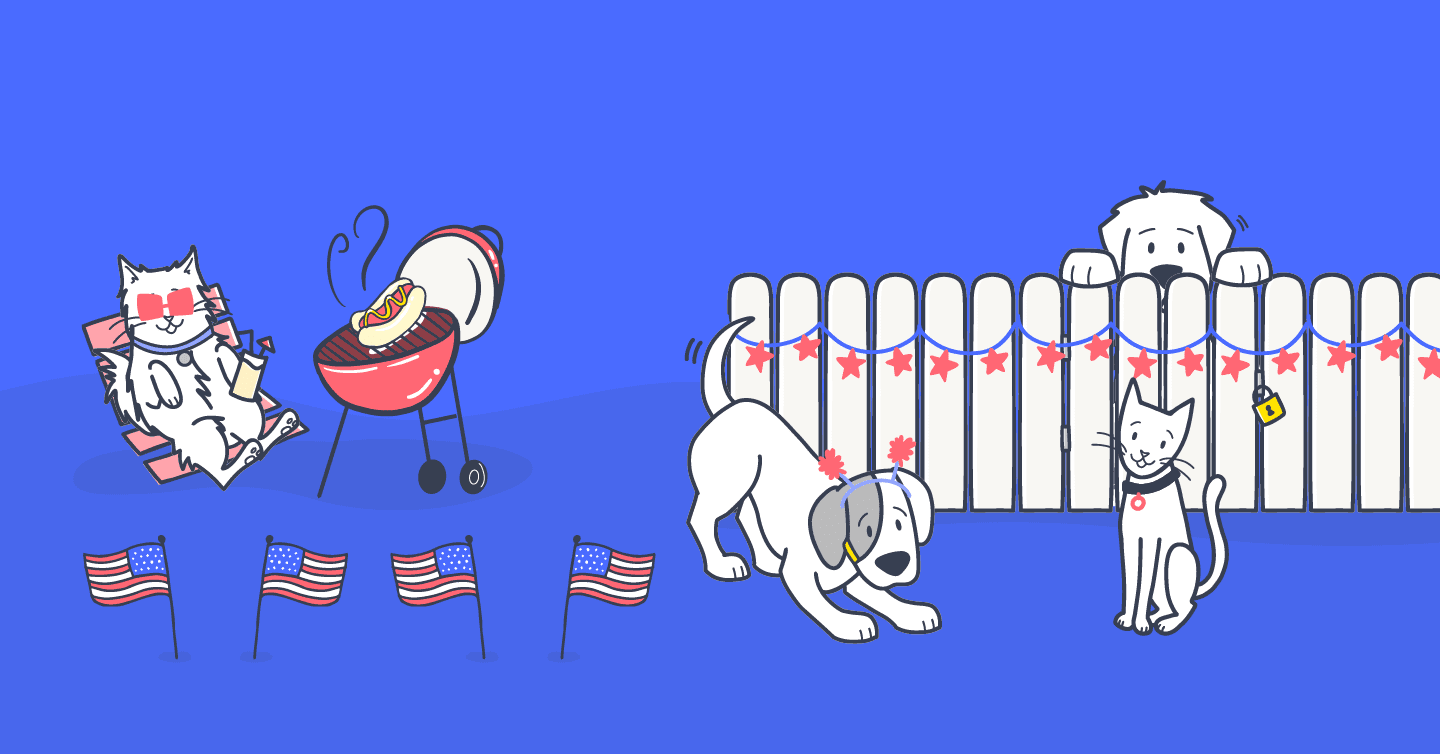The 4th of July is the biggest celebration of the summer, with cookouts, pool parties, and massive firework displays. While this holiday is loads of fun for us humans – our pets need some extra TLC to ensure their happiness and well-being on this holiday too.
Loud noises – especially fireworks – tend to make pets feel anxious. Beyond that, pets can develop heat stroke, or even get poisoned if they consume toxic trash, food scraps, or debris left over from a barbecue. While we want to enjoy the special day with family and friends, keeping our pets safe is the number one priority.
If you are planning on hosting pawtriotic festivities this 4th, we have six tips for hosting a pet-friendly 4th of July BBQ that is fun and safe for your human and furry guests.
1. Take steps to pet-proof your pawty space
Whether you plan to host your holiday festivities outdoors or indoors, pet-proofing your space is a critical first step to avoiding common ruh-rohs that may arise during a busy celebration.
If you plan to celebrate outdoors, only plan to host pets if you have a fenced space. More pets go missing in the summer than any other season, especially around the 4th of July. Only hosting outdoors in fenced spaces and letting your guests know pets will be present can help ensure pets stay where they should be – home.
Setting up a comfy shaded area outdoors or keeping your pet indoors in air conditioning or with a fan is the next step toward pet-proofing your party. During the summer months, our pets are more at risk for heat stroke. The Humane Society warns pet owners to be conscious of humidity levels as well, as this can sometimes have a greater impact on your pet than the heat itself. Animals pant in order to remove moisture from their lungs and cool down, but if the air is too humid, they can’t do so effectively.
No matter where your pets are joining in on the celebrations, make sure they always have lots of water nearby.
2. Steer your pet away from harmful foods
While humans love a holiday BBQ, some of these food items can be a digestive threat for our pets. If given the opportunity, our pets will happily find and eat table scraps, most of which are not good for them. Fatty, barbecued meats and harmful ingredients like onions, garlic, and chocolate should be kept out of paw’s reach! Xylitol, a chemical commonly found in chewing gum, is also very harmful to pets. If guests have purses lying around with gum inside, there’s a chance your pet will find them.
The easiest way to avoid an emergency vet trip for a digestive issue is to keep your pet with you at all times and monitor where guests are disposing of unwanted leftover hotdogs. Consider bringing lidded trash cans into your party space and reminding guests to keep their plates away from pets. And since you can’t expect everyone at an event to look out for your pet, it’s your responsibility to keep human food away from them.
If your pet does eat something harmful, monitor their behavior closely and consider contacting ASPCA’s Animal Poison Control Center at (888) 426-4435. Many foods only cause minor stomach upset and will go away with time or after vomiting, but if your pet seems to be suffering – the best thing you can do is contact your veterinarian or the helpline listed above immediately.
3. Understand how hot is too hot for your pet
For cats and dogs, a body temperature above 102.5 degrees Fahrenheit is too hot, putting your furry friend at risk for heat stroke. High temperatures can heat up the ground your pet walks on, burning their sensitive paw pads. Check the heat by placing your hand or bare foot on the ground before letting your pet step outside. If it’s too hot for you, it’s too hot for them!
To avoid heat-related health issues, it’s best to just keep your pet inside an air-conditioned or otherwise well-cooled area on hot days. If that’s not an option, make sure to have plenty of water available for your pet at all times. Consider buying shoes for your pet to protect their paws from the hot concrete or pavement. You can also carry a small travel fan with you to cool down your pet if they’re getting overheated, or an inflatable baby pool they can hop into.
4. Take measures to prevent your pet from getting lost
PetAmberAlert, a database that helps lost pets reunite with their humans, reports that animal control officials across the country see a 30-60% increase in lost pets around the holiday. This is because of a few factors, the main one being that Independence Day celebrations often give pets more opportunities to leave the house.
Not coincidentally, July is also National Lost Pet Prevention Month. And there’s no better way to prevent the loss of your pet than getting them microchipped. Read our blog post on this topic to learn more about what microchipping is and how it works. Beyond microchipping, make sure your pet’s ID tags are attached to their collars properly. When you are out for your BBQ grocery trip, ensure that your pet is in an enclosed area they can’t escape from, and double-check that all doors, windows, and fences are closed and locked. When the party gets rolling, make sure they’re with you at all times and you’re regularly checking for latched fence doors and closed windows.
5. Be aware of your pet’s noise aversions
Loud noises make pets feel stressed and anxious. If they get really spooked, they might panic and run away. Sparklers, fireworks, and other sources of loud noise can be very unsettling for
pet guests. Also note that the chemicals found in fireworks and sparklers can have very harmful effects on pets if ingested, ranging from gastrointestinal irritation to severe stomach upset. It is best practice to avoid these human party favors completely if you want to host a fully pet-friendly BBQ. (See below for some pet-friendly party favors to keep the energy up).
According to Zoetis, two-thirds of all dogs have noise aversions. (They’re pretty common in cats as well.) To keep your pet calm during the festivities, here are a few things you can do:
- Play calm music for your pet. A quick Google search will lead you to several video and audio tracks specifically designed to create a tranquil atmosphere for your dog or cat.
- Leave an item of clothing or a blanket with your scent on it for your dog. This can help them feel safe and secure when you’re not around.
- Buy a thunder shirt for your fur kid! Proven effective for many pets, it applies gentle, constant pressure to calm anxiety and fear due to environmental triggers, like loud noises.
- If necessary, talk to your veterinarian about anti-anxiety medications, or medications specifically labeled for noise aversion.
You can also better prepare your pet for loud noises ahead of time. Dr. Stacy Choczynski Johnson, Pumpkin’s resident veterinarian, advises pet owners to find a video recording of anxiety-inducing noises like fireworks and to gradually introduce their pet to this sound. “Play it at a low volume, and create a happy, positive experience for your pet,” she says. “This could mean giving a favorite treat, stuffing a puzzle toy full of goodies, or just a relaxing belly scratch. At each subsequent session, you can increase the volume in small amounts. The goal is to get your pet accustomed to the noise.”
6. Engage your pet with a summer treat
We all have seen those puppy dog eyes begging for your scrumptious hamburger at a summer cookout, but we also know fatty foods can be harmful to pets’ stomachs. Instead of risking a holiday emergency, we want to share a dog-friendly treat and cat-friendly enrichment idea to bring some excitement to your pet’s day.
First for our felines, getting your cat a new toy, especially one that is great for them to play with without supervision like these, can be a great way to create a pet-friendly spark of holiday excitement.
For our canine friends, consider making a frozen doggy treat to tickle their taste buds and keep them cool. Our dogs go crazy for this Rover recipe of frozen strawberries, yogurt and xylitol-free peanut butter. Note that you should always consult your veterinarian before having your pet try something new.
In addition to taking these steps to ensure a fun and safe holiday BBQ, Pumpkin Pet Insurance plans are a pawesome way to help you cover crucial veterinary care if they get hurt or sick on future holidays or any day of the year for that matter! To get a free quote, tell us more about your cat or dog here.
Wishing you and your fur family a cool, safe, and pawtriotic 4th of July!




